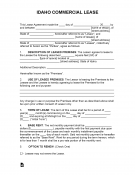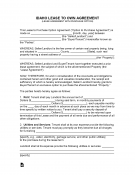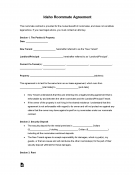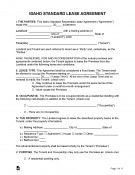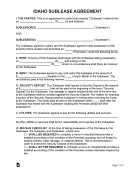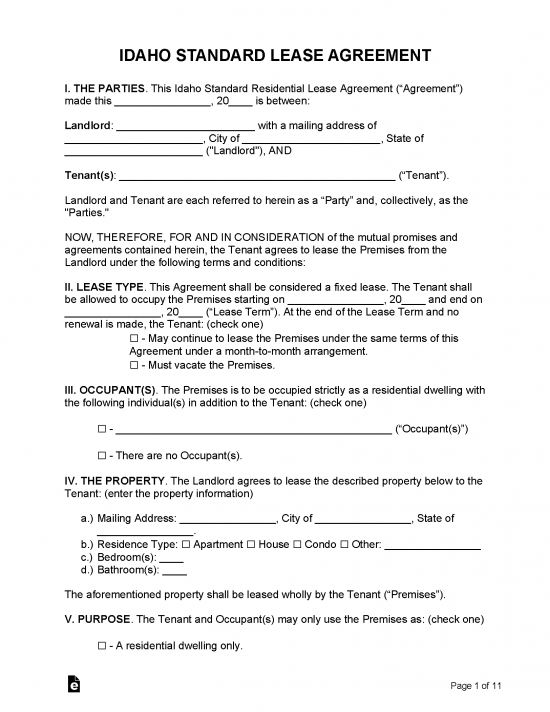Idaho lease agreements contain the terms of a tenant’s lease of a landlord’s property. The agreement will provide the monthly rent, the expectations of the landlord and tenant, as well as other terms that may vary depending on the lease, such as the responsibility for utilities. Both the landlord and the tenant should keep a copy of the lease agreement, and refer to it to prevent disputes.
Contents
By Type (6)
- Commercial Lease Agreement
- Month-to-Month Lease Agreement
- Rent-to-Own Lease Agreement
- Roommate Lease Agreement
- Standard Lease Agreement
- Sublease Agreement
Download: Adobe PDF, MS Word, Rich Text Format
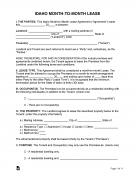 Month-to-Month Lease Agreement
Month-to-Month Lease Agreement
Download: Adobe PDF, MS Word, Rich Text Format
Download: Adobe PDF, MS Word, Rich Text Format
Download: Adobe PDF, MS Word, Rich Text Format
Download: Adobe PDF, MS Word, Rich Text Format
Download: Adobe PDF, MS Word, Rich Text Format
Landlord-Tenant Laws
Statutes – Title 6, Chapter 3 (Forcible Entry and Unlawful Detainer); Title 55, Chapter 3 (Rights and Obligations of Owners)
Required Disclosures (1)
Lead-Based Paint Disclosure – Federal law requires disclosure of the risks associated with lead-based paints when leasing a property where the dwelling unit was constructed prior to January 1, 1978.
Security Deposit Laws
Maximum Amount ($)
The Idaho Code does not limit the maximum amount a landlord may charge a tenant for a security deposit.
Returning to Tenant
Once a lease is concluded, the landlord should return the security deposit to the tenant, except for amounts needed to cover contingencies that have been previously identified in the lease agreement. The landlord and tenant may set in the lease agreement the number of days after the termination of the lease by which the deposit must be returned to the tenant, but this amount may not be more than thirty (30) days; if the lease agreement does not set a duration, it shall be twenty-one (21) days. If the landlord chooses to retain some portion of the deposit, the landlord must provide a signed statement identifying the purpose of the retention, include a detailed list of expenditures (§ 6-321).
When is Rent Due? (grace period)
Idaho law does not regulate the time and place when monthly rent is due, so landlords and tenants may set these terms for themselves in the lease agreement. The law also does not identify a grace period.
Eviction Notice (non-payment)
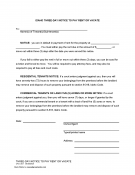 3-Day Notice to Pay or Quit – If the tenant fails to pay rent on the date it is due, the landlord has the right to post this form on the property, informing the tenant of the potential termination of the lease agreement. The landlord should also fill out and have notarized this Affidavit of Service. (§6-303)
3-Day Notice to Pay or Quit – If the tenant fails to pay rent on the date it is due, the landlord has the right to post this form on the property, informing the tenant of the potential termination of the lease agreement. The landlord should also fill out and have notarized this Affidavit of Service. (§6-303)
Download: Adobe PDF
Maximum Fees ($)
Late Rent Penalties
The Idaho Code permits the imposition of fees for paying rent late, and does not set a maximum fee. However, if the landlord intends to charge a late fee, the fee should be identified in the lease agreement.
NSF Checks
Idaho small claims law allows for parties who have received checks with insufficient funds to recover the greater of $100 or three times the value of the original check (§1-2301A). However, it’s unclear whether this provision would apply in the landlord-tenant context. The best practice would be to name a fee for providing checks with insufficient funds in the lease agreement, and for the fee to be reasonably related to the costs borne by the landlord for receiving a faulty check.
Tenant’s Unclaimed Property
If a tenant’s personal property remains on the premises after termination of the lease, the landlord may seek permission from the court to dispose of the property and may use the proceeds from a sale of the property to cover any unpaid expenses the landlord faced as a result of the tenant. The landlord may also seek redress from the tenant to cover the cost of removing and storing property behind (§6-316).
